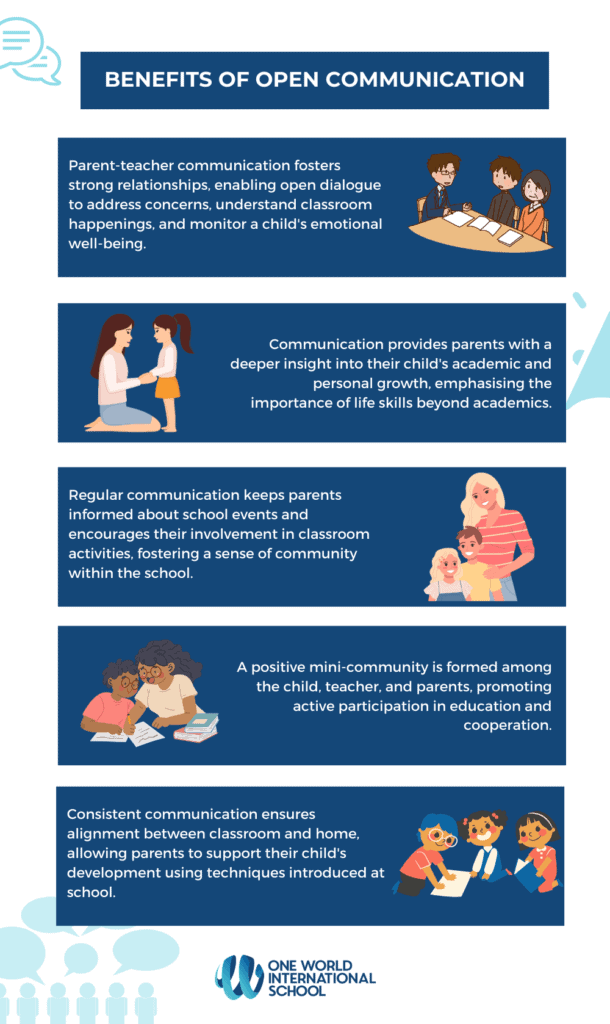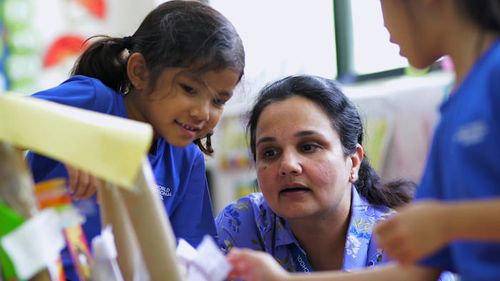Consistently improving communication between parents and educators at One World International School is more than just a goal. It’s a practice that we live out on a daily basis. Our administrators and instructors recognise the importance of open communication in helping a child meet or exceed their own goals. They do everything they can to ensure that parents are able to communicate with the school and that the staff are always on hand to answer questions or give support.
“Parents who are supportive and proactive about their children’s education are more likely to have children who succeed and do well at school,” said Dawn Ross, an early childhood educator. “I think it is also important for the school to be transparent and clear about progress and the achievement of each child in their class when talking to the parents.”

Benefits of Open Communication
● It allows parents to build relationships with their child’s teacher. Parents are able to feel comfortable coming to their child’s teacher with any concerns they may have, and teachers can explain what is happening in the classroom in order to increase understanding. It also opens up two-way communication. For instance, if a child has become quiet and reserved at home, parents may be worried that it is something at school that has caused this. By being able to communicate openly, both the teachers and the parents can keep a close eye on the child, and they will likely pick up why the child is not completely happy. An example of this could be that their friend has moved away recently and they are missing them. Teachers are in a brilliant position to be able to support children to integrate with others in their class to build friendships, and parents are there to offer support when at home and can help children remain in contact with their friends.
● It helps parents better understand their child’s progress. They are able to understand the journey that their child will go on during the year, what topics they will be studying and how different skills will be developed. They can appreciate that OWIS teach their children life skills over and above just academia, as teachers have an opportunity to observe a child’s academic growth as well as their emotional development and social needs. They see the children daily, so they are in the perfect position to monitor their progress. They can provide parents with important insight that can help them build their children into strong, confident learners. Ideally, there is an ongoing dialogue between parents and teachers.
● It keeps parents informed of what’s happening at the school and allows them to get involved in classroom life. When teachers and parents communicate regularly, teachers can provide parents with information about school events and classroom volunteer opportunities. Parents, when they are made aware of these opportunities, often find themselves excited to participate and be a part of the classroom. At OWIS, our school in Singapore is a community and we want parents, families, teachers, administrators and students to feel that they each impact the school’s development. By encouraging everyone to get involved, whether that be by supporting a school play, making cakes for a charity fundraiser or offering time to attend extracurricular activities, this all makes a difference to the overall experience of OWIS.
● A positive mini-community is created between the child, teacher and parents. This triangular approach to communication allows the child to play an active role in their own education, and it ensures that all parties involved are on the same page. It also gives ownership to the child to want to improve their knowledge and skill set. It makes them understand the importance of working together and utilising other people’s knowledge to develop their own. Generally speaking, a positive relationship is able to develop when parents, children and teachers actively communicate with one another.
● It helps to make sure that there is consistency in the classroom and at home. Ultimately, both the parents and teachers need to work together to improve the personal, academic and social development of the child. Parents are offered ways of integrating opportunities at home with the experiences that their child has while at school. Some students may find it hard to concentrate for longer periods, so teachers may have taught them focus management techniques for this. By utilising these at home as well, it gives the child continuity and allows them to practise these techniques in a range of situations. Through communication, both parties can use a consistent approach that will benefit the individual learner.
At OWIS, we keep the lines of communication open in various ways throughout the school year. One of the most important ways through which we ensure there is effective communication between parents and teachers is through our weekly updates and parent-teacher consultations. We always appreciate feedback and we encourage parents to be highly involved in their child’s education and development. We encourage them to ask questions, attend school events and to communicate with our staff.

For more information about communication efforts at OWIS, contact us today.
(This blog was originally written in collaboration with Mr Adam Meyerhoff, former Senior Coordinator (Teaching & Learning) – Secondary School, OWIS Nanyang.)














